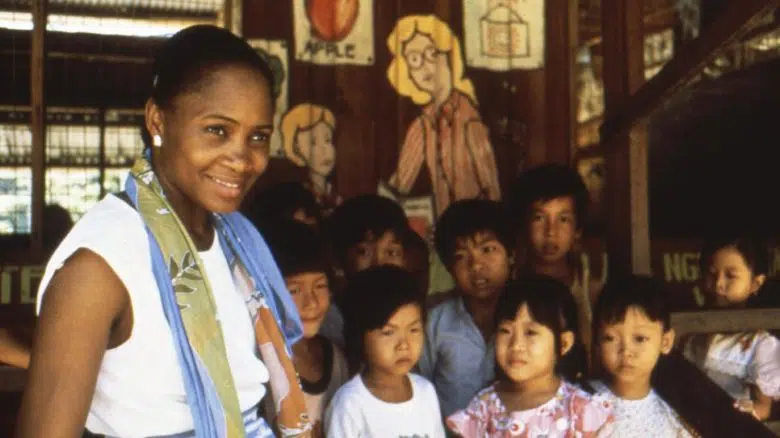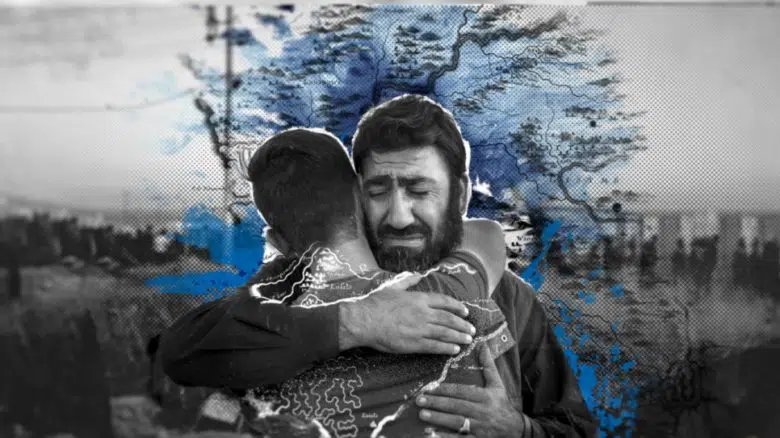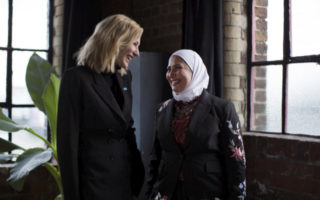
Hendricks visiting Vietnamese refugees on the island of Pulau Bidong in Malaysia in 1989. © Album Productions
On the 70th anniversary of the 1951 Refugee Convention, celebrated performer and Honorary Lifetime Goodwill Ambassador looks back at her 35-year role with the UN Refugee Agency.
By UNHCR Staff
UNHCR’s longest-serving Goodwill Ambassador – world-renowned classical singer Barbara Hendricks – has described her most memorable encounters and emotions experienced during nearly 35 years working with forcibly displaced people, in a revealing interview to mark the 70th anniversary of the 1951 Refugee Convention.
Born in Arkansas in 1948, Hendricks grew up during racial segregation in the United States. Her experiences during that period and the subsequent civil rights movement inspired a lifelong belief in the importance of upholding human rights for all.
After becoming established on both sides of the Atlantic as a singer of opera, jazz and classical music, she moved to Europe and in 1987 was approached by UNHCR, the UN Refugee Agency, about becoming a Goodwill Ambassador.
“As I began to read the material about UNHCR, I realised that it could be a possibility for me to put into action my belief that there is nothing more important than the defence and the promotion of human rights,” Hendricks said.
Her first overseas visit in the role was in 1989 to Zambia and Mozambique, where she met refugees hoping to return home to Namibia ahead of the country’s independence. While some were able to go back and rebuild their lives, others had to wait another 14 years before they could safely return – two contrasting fates that left a lasting impression.
“There I was able to see really two of the situations that I was going to be confronted with seeing during the next 35 years,” Hendricks said. “The first one is the one that makes me happy … where people can go home. All the refugees that I have met want to return home. They want to return to their families, their country, their culture. But they don’t have that choice all the time.”
During a visit to Sarajevo in 1993 while the city was under siege, Hendricks was singing a spiritual song to a small audience when her performance was punctuated by a loud explosion.
“That was a bomb, and it was just on the street outside,” she remembered. “I didn’t miss a note and I kept singing. And I said [to myself]: ‘Well, if I’m going to die, I can’t think of a better way of doing it than singing one of my favourite spirituals’.”
Reflecting on the importance of the 1951 Refugee Convention, Hendricks said it emerged from the collective sense of hope and new beginnings that followed World War Two, and would continue to guide UNHCR’s work as it adapts to new global challenges that will drive future displacement.

Animation to mark 70 years of the Refugee Convention (UNHCR; LonelyLeap)
“These last 70 years have given UNHCR an incredible experience in helping refugees and protecting refugees,” Hendricks said.
“UNHCR will continue to have to be flexible, light on its feet in order to deal with populations on the move. And that’s what we do. And we do it best. And I think that we will be up to the task and and we need everyone to work with us, every citizen of every country to work with us. To make the world a better place for all of our children and all of our grandchildren.”
Hendricks has been awarded the Legion d’Honneur in France and was the Founding President of Sverige för UNHCR – the agency’s fundraising partner in Sweden, where she holds citizenship – and remains its Honorary President.
In recognition of her outstanding commitment to refugees, in 2002 UNHCR named Hendricks as Honorary Lifetime Goodwill Ambassador. As a result, her association with the organization has endured for almost half the agency’s total lifespan.
“I don’t look at the numbers. I look at the faces.”
During that period, the number of forcibly displaced and other people under the agency’s care has increased from around 5 million to more than 80 million. Hendricks said such a staggering increase represented a collective failure of will, but added that she chooses not to focus on the numbers themselves and refuses to lose heart.
“From 5 million to 80 million – we have failed, but not UNHCR. We in the world have failed because we’ve become too complacent and too comfortable and have forgotten how easy it is to lose everything,” she said.
“You might ask me: ‘Isn’t that discouraging?’ Just looking at those figures, yes, of course it is. But I just don’t look at the numbers. I look at the faces.” Hendricks added.
“We cannot control the conflicts. We can’t control how many people are forced to flee. But what we can do is make it possible for us to lend a hand to our neighbours in need wherever they may be. And we are enough on this earth to take care of 80 million people. And to not see that as something that is unattainable, because we do it one refugee, one child, one family at a time, and then it’s possible.”





